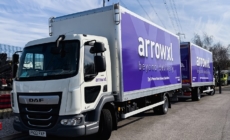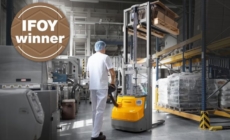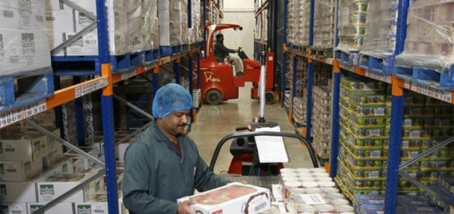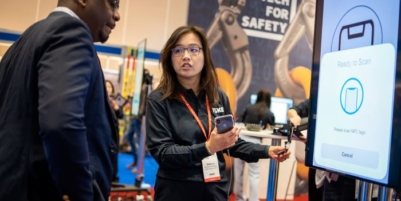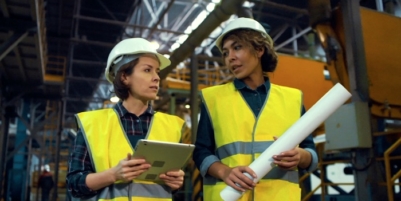-
ROSSLARE EUROPORT TARGETS HEALTH & SAFETY WITH CAMERA TELEMATICS PARTNERSHIP - 2 days ago
-
Landmark Study Reveals Wearable Robotics Significantly Boost Safety and Efficiency in Industrial Environments - July 24, 2024
-
Visku Tackle The Retail Seasonality Challenge One Pallet At A Time - July 22, 2024
-
KAMMAC AND BERGEN LOGISTICS STRENGTHEN FASHION & LIFESTYLE SERVICES IN THE UK - July 19, 2024
-
TENTBOX EXTENDS PARTNERSHIP WITH ARROWXL TO SUPPORT INCREASING DEMAND - July 17, 2024
-
The Perfume Shop improves customer journeys while driving profitability in partnership with Scurri - July 17, 2024
-
ZEROMISSION SECURES £2.3M ($3M) INVESTMENT TO ACCELERATE ELECTRIC FLEETS - July 16, 2024
-
BCMPA CELEBRATES SUCCESS OF 2024 CONFERENCE - July 15, 2024
-
Best of the Best: Jungheinrich Celebrates Triple International Award Win - July 12, 2024
-
GOPLASTICPALLETS.COM CALLS ON NEW CHANCELLOR RACHEL REEVES TO CONSIDER PLASTIC PACKAGING TAX REFORM - July 10, 2024
The ‘Brexit Boost’ that has benefited the 3PL sector for so long appears to be coming to an end, says John Maguire
Last summer warehouses across the UK were full. “There is no available space,” Peter Ward of the UK Warehousing Association told BBC Newsnight in July 2019.
The lack of spare capacity was in part the result of stockpiling as companies attempted to shore up their supply chains ahead of Britain’s departure from the EU amid growing fears that vital cargo would be held up at the ports if the ‘no deal’ scenario became reality.
And, as more and more businesses – particularly food and FMCG manufacturers – opted to bolster their inventory, there is no doubt that the third party logistics sector enjoyed something of a ‘Brexit Boost’: empty pallet spaces in racking became a rare site as the ‘Sorry – We’re Full’ signs went up outside 3PL facilities everywhere.
The increase in grocery retail sector inventory proved very useful during the early days of the Covid-19 crisis when panicking consumers bought up essential items in extravagant quantities.
But, the national shopping spree that Coronavirus fears prompted has left stock levels depleted and, as the world comes to terms with the ‘new normal’ of living with Covid-19 and the extent of the lockdown-induced squeeze on the economy becomes apparent, it seems inevitable that the amount of stock held in warehouse and distribution facilities will continue to reduce.
As a result, FMCG and food companies will look to their supply chains to deliver the economies that will be needed to offset the impact of falling consumer confidence on their business in the months ahead.
Of course, the 3PL sector operates on notoriously tight margins and successful logistics businesses will have the agility to respond to the shifting needs of their client base by implementing cost saving operational changes within their warehouse facilities.
Through its Warehouse Systems Division, Narrow Aisle Ltd has worked with many third party logistics companies to transform existing warehouses and significantly improve efficiency and reduce operating costs.
We provide a free survey of a site’s potential storage capacity and supply CAD drawings and an overall appraisal of the operation as part of our full turnkey project management service.
And when it comes to increasing storage density in existing warehouses, Flexi articulated trucks – with their ability to operate in very narrow aisleways and lift pallet loads to heights of over 14 metres – are ideal machines for 3PL companies that are looking to consolidate storage space or introduce a greater emphasis on B2C online fulfillment processes for clients whose previous requirements had been for straightforward B2B stock replenishment services.
With 3PL capital expenditure budgets likely to be squeezed, we expect to see more third-party logistics service companies embracing mixed fleets of new and used machines. Narrow Aisle can supply rebuilt truck fleets on attractive long-term contract hire terms and while, historically, used materials handling equipment has been most popular with small- to medium-sized companies with a need to increase or upgrade their storage capacity but with budgets that do not quite stretch to new VNA machinery, there is already a trend for large 3PL organisations to include factory rebuilt trucks in their overall fleets to manage costs appropriately.
The economic impact of the Covid-19 lockdown is likely to be felt for some time and, as a consequence, food and FMCG suppliers will have significantly reduced storage demands. 3PLs must act swiftly to consolidate empty warehouse space and reconfigure their storage systems to reduce storage costs if they are going to optimise their operational efficiency and safeguard their margins as we all adjust to the ‘new normal’ of the post-lockdown trading conditions.
John Maguire is managing director of Narrow Aisle Ltd and a past chairman of the UK Warehousing Association.






